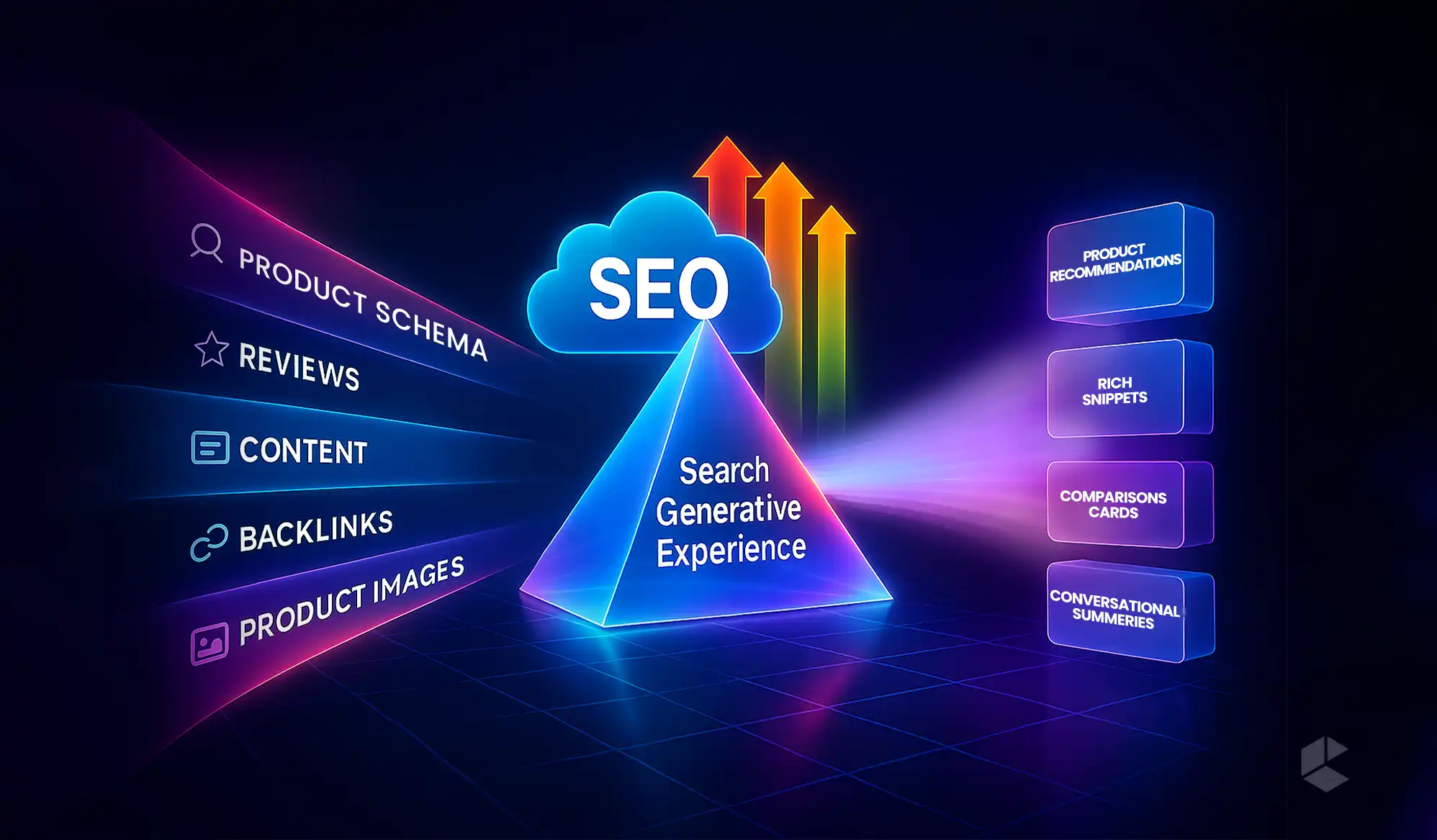- With its open-source architecture, Magento enables businesses to create custom eCommerce platforms packed with features.
- Magento offers scalability for all business sizes, ranging from small startups to enterprises with enormous catalogs of products.
- From SEO optimization to multi-store management, Magento comes with high-end features along with scopes for customization and flexibility.
- Maintaining a Magento store requires extensive technical and logical knowledge, making it a poor choice for people with nominal or no technical know-how.
- If a business does not have enough resources or budget, Magento can be a challenging solution as it is resource and cost-intensive.
Magento stands out as one of the most adaptable online shopping platforms you can find. Its strong structure, a wide range of customization options, and ability to grow have made it a top pick for companies looking to create unique buying experiences. But it’s not all smooth sailing.
This guide takes a close look at the pros and cons of Magento, giving you the knowledge you need to make a smart choice.
Magento Open-Source vs Adobe Commerce
You can get Magento in two main versions: Magento Open Source and Adobe Commerce (which used to be called Magento Enterprise). While they share the same basic design, they’re made to meet different business needs.
Magento Open Source
For small to mid-sized business looking to sell online, Magento Open Source is probably the most lucrative solution. Not only does it allow you to manage all products, but it also offers checkout setup and SEO optimization options. You can get control over your site as the platform lets you modify the code. But probably the biggest catch about this platform is its free-to-use nature, which definitely helps small or new companies make some savings while getting all the eCommerce goodness.
Adobe Commerce
On the other hand, the second version of Magento is a premium option, built to cater to the enterprise-level companies. With Adobe Commerce by your side, you can enjoy the top-tier features on a powerful platform that can handle heavy traffic! From data analysis to customer grouping, creating business insights, and offering customized shopping experiences, Adobe Commerce is the one-stop destination for everything eCommerce. This platform has added security features and technical support that come in handy for supporting the needs of large businesses.
Advantages of Magento(Adobe Commerce)
Magento comes with a number of benefits adding to the growth of any online store.
1. Open-Source Flexibility
The main reason behind Magento’s huge popularity and growing community is the open-source framework it offers. It enables developers to make customizations based on the exact requirements.
With Magento, developers have the freedom to customize core functions, write custom modules, and integrate third-party apps to develop unique online stores. This flexibility proves to be particularly helpful for businesses operating in niche markets or with unique requirements. For example, specialty shops selling handmade items can build a custom product display to highlight its creativity. On the other hand, in the case of a tech firm, they may add advanced configurators for custom builds. Magento can come in handy in both these cases.
2. Scalability for Growing Businesses
Regardless of the business size or type, Magento is one of the finest solutions as it can adapt to your specific requirements and scale along with your growth.
The platform can effortlessly manage stores with a small list of products to businesses with a huge catalog. You can leverage the powerful architecture of the open-source platform to get high performance, even during peak hours like Black Fridays! Renowned global brands like Coca-Cola (for B2B ordering platform) and Ford use Magento to run their eCommerce operations, which speaks volumes in the platform’s favor.
Although it’s not just product management where Magento excels! If you want to run multiple storefronts from one backend, Magento makes the entire process effortless. This becomes useful, especially for global brands targeting multiple regions.
3. Advanced Feature Set
Magento incorporates all the necessary tools to make sure that you never need to worry about third-party applications.
With Magento, you are able to get a range of fully-fledged features that make managing multiple stores, working with high-end product configurations, offering smooth customer navigation, and incorporating customizable pricing rules very easy. This helps businesses operate more productively, deliver personalized customer experiences, and increase sales.
For example, the multi-store feature allows a retailer to run distinct branded storefronts under different designs and currencies with separate product catalogs, all from a single dashboard. Moreover, it allows dynamic promotions based on customer behavior, which builds customer loyalty and encourages repeat purchases.
With mobile-enabled architecture, Magento offers a rich, engaging shopping experience across devices! This gives the platform an undeniable appeal in today’s mobile-first world.
4. SEO-Friendly Architecture
The platform has advanced SEO features that include customizable URLs, meta tags, sitemaps, and schema markup. In addition, due to Magento’s ability to manage huge amounts of product data, even stores with extensive catalogs can maintain exceptional SEO performance.
For example, a bookstore can use the layered navigation and tagging system to create SEO-friendly product pages around certain genres, authors, or topics. This improves the store’s discoverability and drives organic traffic.
With its SEO-oriented structure, your online store can dominate the SERP with timely optimization.
5. Huge Community and Ecosystem
The support and resources provided by Magento’s worldwide community are among its strongest aspects.
From forums and documentation to third-party extensions and update patches, the global Magento community can assist in every aspect of your store development. With constant contributions from developers, agencies, and solution partners across the globe, the Magento ecosystem has continuous additions of new features, bug fixing, and security patches.
This community-centered approach works in favor of small to large businesses.
For example, a startup struggling with a specific functionality can find a ready-made solution for the issue within the Magento Marketplace or they can get suggestions in community forums.
6. Third-Party Integration Capabilities
Magento easily integrates with a huge number of external, third-party tools, including CRMs, ERPs, and payment systems. This capability enables businesses to keep their operations synchronized across platforms, adding to customer satisfaction and overall business efficiency.
Example: A shop that uses Salesforce as its CRM can integrate it with Magento to achieve efficient customer data handling and targeted marketing efforts.
7. Omnichannel Support
Magento’s omnichannel support is one of the biggest benefits every eCommerce store can enjoy. It allows your customers to interact with the store across a variety of touchpoints, from online platforms to physical stores and even social media! Moreover, it can easily integrate with eBay, Amazon, and other leading marketplaces.
Modern businesses can leverage the omnichannel capability of the platform to sync their operations and inventory updates in real time through a centralized backend system for all channels. This can transform the shopping experience and operational efficiency.
With advanced, customer-centric features like buy online, pick up in-store (BOPIS), Magento closes the gap between online and offline. To ensure your omnichannel success, Magento’s customer segmentation tools allow for targeted product recommendations, personalized marketing campaigns, and custom promotions across all channels.
8. GDPR and Compliance Laws
Did you know, failing to comply with GDPR can lead to financial penalties of up to 20 million euros or 4% of global annual turnover (whichever is higher)? That’s why complying with laws and regulations like the General Data Protection Regulation (GDPR) in the European Union or the California Consumer Privacy Act (CCPA) in the United States is now more important than ever! While the regulations are becoming stricter, Magento offers the right tools to meet all requirements that ensure data privacy.
From facilitating customer requests for data access, portability, and deletion to enabling them to opt out of data tracking with cookie consent pop-up integration to storefronts, Magento comes with a number of compliance features. The platform even provides mechanisms to anonymize customer data and store sensitive information with advanced encryption protocols.
With added security and data privacy, Magento helps online stores build trust and minimize the risk of penalties.
9. Powerful and Flexible Content Management
Providing unmatched control and flexibility, Magento’s content management system helps in creating engaging online stores. Thanks to its dynamic content feature, merchants can create custom rules for their content. For example, merchants can set rules for banner messages based on customer behavior or geographic location in order to increase sales.
Although Magento requires considerable technical expertise in most aspects, that’s not the case when it comes to building/customizing pages. You get a page builder with Magento 2 Open Source that lets you design and customize pages using the drag-and-drop feature. On top of that, the platform simplifies creating visually stunning product pages as it supports high-quality images, videos, and banners.
Not only does Magento’s powerful content management system provide access to pre-built themes, but it enables merchants to build their themes from scratch. In this way, merchants can create a strong brand identity while leaving a lasting impact.
10. Simplified PCI Compliance
When it comes to running a successful online store, complying with PCI DSS is one of the most critical aspects. It ensures security towards the cardholder data processes, storage, and sharing, which leads to better customer trust. Besides, when you fail to comply with it, it may incur penalties from $5,000 to even $100,000 on a monthly basis, depending on the violation.
Magento simplifies PCI compliance as it easily integrates with PCI-certified payment processors like Stripe, PayPal, Authorize.net, etc., which confirms secure transactions. The eCommerce platform takes data security to the next level with two advanced security features:
- Advanced data encryption methods that keep customer data protected at the time of transaction.
- Tokenization support that alters card details with unique tokes, which reduces the risk of data breaching.
Apart from all these intuitive features, Magento’s huge developer community actively releases updates that fix potential vulnerabilities and protect all sensitive data. With simplified PCI compliance, Magento ensures security standards, allowing businesses to focus on their operation and growth.
Disadvantages of Magento( Adobe Commerce)
While Magento is an exceptional and widely used system for eCommerce development, there are some disadvantages of the open-source platform, given the use case and scenario.
1. High Development Costs
Although the open-source edition of Magento is free, the cumulative cost of development can be hefty.
There’s usually a high demand for skilled Magento developers to efficiently utilize all the features offered by this platform, which makes it pretty pricey to hire them! Further, businesses have to invest in high-end hosting to get flawless performance, which adds to the expenses. Moreover, the resources deployed for security and maintenance are another investment to consider.
For example, a mid-sized retailer expecting a customized design alongside multiple integrations may need to invest at least tens of thousands of dollars during initial setup, which can be unfitting if they want to start small.
2. Steep Learning Curve
With so many features and complex customization options, Magento can intimidate first-time users.
Contrary to platforms like Shopify, which are designed with ease of use in mind, Magento requires some background knowledge! You have to have an understanding of Magento’s architecture for proper configuration and administration. This steep learning curve makes it hard on non-technical users. This means, either you have to get additional training or hire an expert, which will take a toll on your time or money.
For example, if you were configuring a multi-store or integrating an ERP system, it could take weeks. So, you have to compromise on the time to market.
3. Performance Demands
Magento is a powerful platform requiring powerful hosting solutions to work efficiently.
Most shared hosting environments are unable to support the platform, which results in a large amount of downtime or very slow loading times during peak times. Therefore, smooth performance can only be ensured if an organization invests in a dedicated server or cloud hosting, which, of course, are way costlier.
Moreover, if you start with a cheaper hosting option with plans to switch to a better solution in the future, that can backfire too! When you make the shift to support your business growth, be prepared for more expenses and downtime that can affect your business.
4. Time-Consuming Customization
While the large customization options of Magento are definitely an advantage, it also has a downside.
While the layered architecture of the platform is very powerful, it requires proper planning and execution in complex projects. This longer development cycle often delays launches and updates in the store.
Is Magento Suitable for Your Business?
Magento is a highly functional eCommerce system that comes with top-tier features, flexibility, and scalability. Whether you should pick the platform for your eCommerce needs totally depends on your capability, requirements, and goals.
If you can code or have the budget to hire an expert, Magento can be an exceptional help as it comes with no upfront cost and is packed with advanced capabilities. But if you want ease of use without including additional resources, you may need to think of other alternatives.









